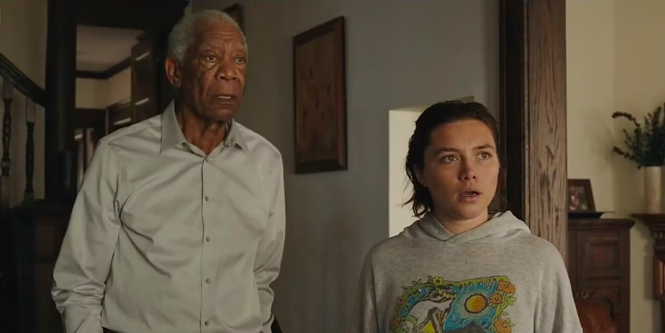Support the Free Press | Facts matter. Truth matters. Journalism matters
Salt Lake City Weekly has been Utah's source of independent news and in-depth journalism since 1984. Donate today to ensure the legacy continues.
Thursday, March 23, 2023
Film Reviews: New Releases for March 24
John Wick: Chapter 4, A Good Person, The Lost King, Return to Seoul
Posted By Scott Renshaw on March 23, 2023, 9:00 AM
A Good Person **
The earnestness with which writer/director Zach Braff serves up his story—and the great actors he has on board—are almost enough to cover over how much of a narrative and thematic mess it is. But not quite. Florence Pugh stars as Allison, a young woman looking at a happy future with her fiancé Nathan (Chinaza Uche), until her distracted driving results in the death of Nathan’s sister and brother-in-law. One year later, Allison is facing an addiction to prescription opioids, just as she reconnects with Nathan’s father Daniel (Morgan Freeman), who’s now raising his orphaned 16-year-old granddaughter, Ryan (Celeste O’Conor). Braff seems like he wants to address the idea of what we’re able to forgive—both in others and in ourselves—but he keeps tripping over inconsistent character behavior, like Ryan’s abrupt shift from hating Allison for her role in her parents’ death to treating her like a friend/mentor, or whether Allison’s mother (Molly Shannon) is an enabler or a help to Allison. And it doesn’t help that Braff’s visual interpretations of drug abuse falls back on lazy visual bits like blurred-around-the-edges images. Pugh seems incapable of emotional dishonesty, so she sells the hell out of Allison’s torment, and Freeman does his best despite Braff relying on the old “Morgan Freeman starts the movie with narration” trick to lend gravitas. As is true of the people in the movie, there’s a difference here between being “well-meaning” and being “good.” Available March 24 in theaters. (R)
John Wick: Chapter 4 ***1/2
See feature review. Available March 24 in theaters. (R)
The Lost King ***
From the very first moments, with a score of jagged strings by Alexandre Desplat and an opening credits design reminiscent of Saul Bass, director Stephen Frears clues you in that this fact-based story is a bit different from your typical feel-good drama; it’s more like a mystery. Sally Hawkins plays Philippa Langley, a woman living with chronic fatigue syndrome and working at a demeaning office job when she becomes fascinated in 2012 with the legacy of King Richard III, and sets out to accomplish what centuries of historians and archeologists had never managed: locating Richard III’s remains. Not surprisingly, she encounters resistance both from the historical establishment and (at least initially) from her skeptical ex-husband (Steve Coogan, who co-wrote the screenplay). But while Hawkins’ performance is in part about underdog pluckiness, it’s more built on the way she identifies with a person whose disability was used to define them as less-than, to the extent that she has visions of the king (Harry Lloyd). More significantly, it’s a tale of how Philippa’s detective work provides her with a sense of being capable, even as the reality of her illness affects her. While there are certainly predictable components to the narrative’s structure, as a character study The Lost King emphasizes the suspense built into someone’s own uncertainty about whether they can be more than their diagnosis. Available March 24 in theaters. (PG-13)
Return to Seoul ***1/2
You just don’t often get protagonists with as much complexity and potential unlikeability as Freddie Benoît (Park Ji-min)—and that’s a big part of what makes writer/director Davy Chou’s feature so terrific. It opens with 25-year-old Freddie, a Korean-born adoptee raised in Paris, making her first adult trip back to Seoul, initially by a fluke of circumstance but then to begin the process of finding her biological parents. That quest doesn’t go quite the way Freddie is expecting, and over the course of several subsequent years, Freddie navigates a rocky path at putting together the different pieces of her upbringing and identity. There are echoes here of the phenomenal 2003 documentary Daughter from Danang, built on a young woman who’s not expecting the emotional complexity and culture shocks involved in meeting members of her biological family. But Chou gives that scenario even more bite by refusing to allow the idea that Freddie is simply a passive victim of her circumstances. Park’s performance evolves as we watch time pass, from a tangled mess of emotions, erratic behavior and mistreating those she calls friends, to someone trying to cope with developments like her birth mother’s ongoing refusals to meet with her. Even her eventual work for an international arms broker feels like part of that journey, as she takes on the role of a Westerner trying to “save” South Korea from the North. It’s a fascinating piece of character-based storytelling, with Park anchoring a wonderfully complex exploration of how one person decides what parts of herself can, or should, define her. Available March 24 at Broadway Centre Cinemas. (R)
The earnestness with which writer/director Zach Braff serves up his story—and the great actors he has on board—are almost enough to cover over how much of a narrative and thematic mess it is. But not quite. Florence Pugh stars as Allison, a young woman looking at a happy future with her fiancé Nathan (Chinaza Uche), until her distracted driving results in the death of Nathan’s sister and brother-in-law. One year later, Allison is facing an addiction to prescription opioids, just as she reconnects with Nathan’s father Daniel (Morgan Freeman), who’s now raising his orphaned 16-year-old granddaughter, Ryan (Celeste O’Conor). Braff seems like he wants to address the idea of what we’re able to forgive—both in others and in ourselves—but he keeps tripping over inconsistent character behavior, like Ryan’s abrupt shift from hating Allison for her role in her parents’ death to treating her like a friend/mentor, or whether Allison’s mother (Molly Shannon) is an enabler or a help to Allison. And it doesn’t help that Braff’s visual interpretations of drug abuse falls back on lazy visual bits like blurred-around-the-edges images. Pugh seems incapable of emotional dishonesty, so she sells the hell out of Allison’s torment, and Freeman does his best despite Braff relying on the old “Morgan Freeman starts the movie with narration” trick to lend gravitas. As is true of the people in the movie, there’s a difference here between being “well-meaning” and being “good.” Available March 24 in theaters. (R)
John Wick: Chapter 4 ***1/2
See feature review. Available March 24 in theaters. (R)
The Lost King ***
From the very first moments, with a score of jagged strings by Alexandre Desplat and an opening credits design reminiscent of Saul Bass, director Stephen Frears clues you in that this fact-based story is a bit different from your typical feel-good drama; it’s more like a mystery. Sally Hawkins plays Philippa Langley, a woman living with chronic fatigue syndrome and working at a demeaning office job when she becomes fascinated in 2012 with the legacy of King Richard III, and sets out to accomplish what centuries of historians and archeologists had never managed: locating Richard III’s remains. Not surprisingly, she encounters resistance both from the historical establishment and (at least initially) from her skeptical ex-husband (Steve Coogan, who co-wrote the screenplay). But while Hawkins’ performance is in part about underdog pluckiness, it’s more built on the way she identifies with a person whose disability was used to define them as less-than, to the extent that she has visions of the king (Harry Lloyd). More significantly, it’s a tale of how Philippa’s detective work provides her with a sense of being capable, even as the reality of her illness affects her. While there are certainly predictable components to the narrative’s structure, as a character study The Lost King emphasizes the suspense built into someone’s own uncertainty about whether they can be more than their diagnosis. Available March 24 in theaters. (PG-13)
Return to Seoul ***1/2
You just don’t often get protagonists with as much complexity and potential unlikeability as Freddie Benoît (Park Ji-min)—and that’s a big part of what makes writer/director Davy Chou’s feature so terrific. It opens with 25-year-old Freddie, a Korean-born adoptee raised in Paris, making her first adult trip back to Seoul, initially by a fluke of circumstance but then to begin the process of finding her biological parents. That quest doesn’t go quite the way Freddie is expecting, and over the course of several subsequent years, Freddie navigates a rocky path at putting together the different pieces of her upbringing and identity. There are echoes here of the phenomenal 2003 documentary Daughter from Danang, built on a young woman who’s not expecting the emotional complexity and culture shocks involved in meeting members of her biological family. But Chou gives that scenario even more bite by refusing to allow the idea that Freddie is simply a passive victim of her circumstances. Park’s performance evolves as we watch time pass, from a tangled mess of emotions, erratic behavior and mistreating those she calls friends, to someone trying to cope with developments like her birth mother’s ongoing refusals to meet with her. Even her eventual work for an international arms broker feels like part of that journey, as she takes on the role of a Westerner trying to “save” South Korea from the North. It’s a fascinating piece of character-based storytelling, with Park anchoring a wonderfully complex exploration of how one person decides what parts of herself can, or should, define her. Available March 24 at Broadway Centre Cinemas. (R)
On Topic...
-
Film Reviews: New Releases for April 19
The Ministry of Ungentlemanly Warfare, Abigail, The Beast, Hard Miles, Sasquatch Sunset and more
- Apr 19, 2024
-
Film Reviews: New Releases for April 12
Civil War, Escape from Germany, Coup de Chance, Hundreds of Beavers, La Chimera, Sting
- Apr 11, 2024
-
Film Reviews: New Releases for April 5
Monkey Man, The First Omen, Wicked Little Letters, Girls State, Scoop, Exhuma
- Apr 4, 2024
- More A&E » More Culture » More Movies »
More by Scott Renshaw
-
Film Reviews: New Releases for April 19
The Ministry of Ungentlemanly Warfare, Abigail, The Beast, Hard Miles, Sasquatch Sunset and more
- Apr 19, 2024
-
Faces of Salt Lake County book and portrait reception
Images and personal stories in a new book reveal local demographic diversity
- Apr 17, 2024
-
Feature film review: THE BEAST
A filmmaker's compelling ideas get a bit tangled in references to his creative influences.
- Apr 17, 2024
- More »






